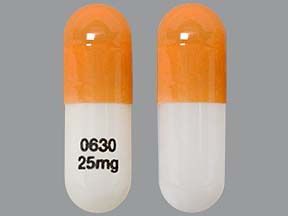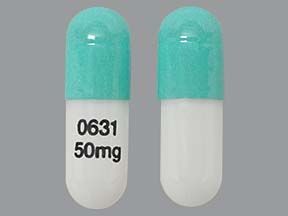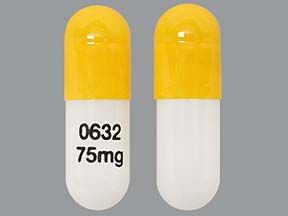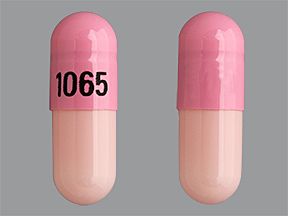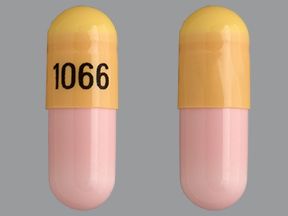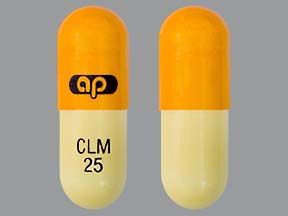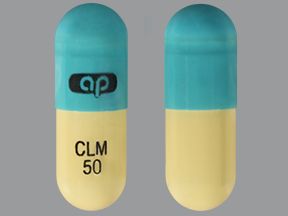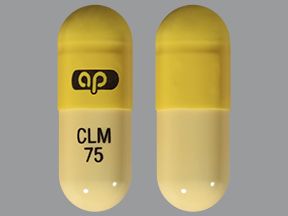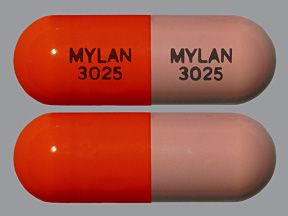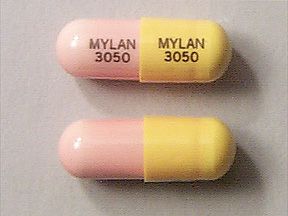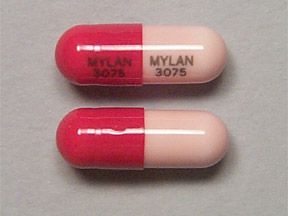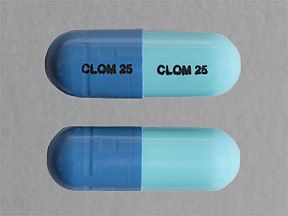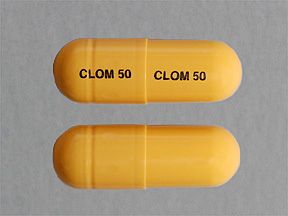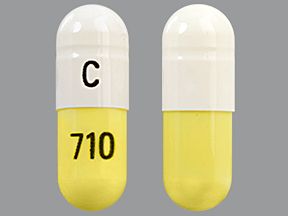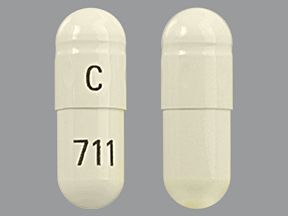Highlights for clomipramine
- Clomipramine oral capsule is available as a generic drug and a brand-name drug. Brand name: Anafranil.
- Clomipramine comes only as a capsule that you take by mouth.
- Clomipramine oral capsule is used to treat the excessive and repetitive ideas, thoughts, and impulses of obsessive-compulsive disorder.
FDA warning: Suicidal behavior
- This drug has a black box warning. This is the most serious warning from the Food and Drug Administration (FDA). A black box warning alerts doctors and patients about drug effects that may be dangerous.
- You may be at greater risk for suicidal behavior or thoughts if you are a child or young adult and you take this drug. Your doctor will monitor you for behavior changes and worsening of your disorder while you are taking this drug.
Other warnings
- Serotonin syndrome warning: While taking this drug, you may be at risk for a life-threatening condition called serotonin syndrome. This condition occurs when the level of serotonin in your body is too high. It can result in nausea, vomiting, diarrhea, and agitation. It can also result in delirium, coma, muscle rigidity, tremor, seizures, and sometimes death.
- Seizures warning: This drug may increase your risk of seizures. Your risk of seizures is higher if you have a history of seizures, alcoholism, or another disorder that increases your risk of seizures. If you have any of these conditions, talk to your doctor about your risk of seizures while taking this drug.
- Sexual dysfunction warning: This drug can cause sexual problems in both men and women, including decreased sexual desire and ability to have an orgasm. In men, it can also cause problems with ejaculation (painful or delayed ejaculation) and impotence (troubling getting an erection). Talk to your doctor if you have these problems while taking this drug.
- Dementia warning:
Research has indicated that this type of medication can cause effects similar to those caused by drugs called anticholinergics. This can raise your risk of dementia.
Clomipramine is a prescription drug. It comes as a capsule you take by mouth.
Clomipramine oral capsule is available as the brand-name drug Anafranil. It’s also available as a generic drug. Generic drugs usually cost less than the brand-name version. In some cases, they may not be available in all strengths or forms as the brand-name drug.
Why it’s used
Clomipramine is used to treat the excessive and repetitive ideas, thoughts, and impulses of obsessive-compulsive disorder. It’s most often used when obsessions and compulsions cause you major distress and interfere with your work or social life.
How it works
Clomipramine belongs to a class of drugs called antidepressants and works as an anti-obsessional agent. A class of drugs is a group of medications that work in a similar way. These drugs are often used to treat similar conditions.
Clomipramine works by reducing obsessions and compulsions. It’s not entirely clear how the drug does this. It’s thought that it works by increasing the activity of certain chemicals in your brain called norepinephrine and serotonin. These chemicals are believed to help regulate mood and behavior.
Clomipramine oral capsule may cause drowsiness and other side effects.
More common side effects
The more common side effects of clomipramine can include:
- dry mouth
- constipation
- nausea
- heartburn
- increased appetite
- drowsiness
- tremor
- dizziness
- nervousness
- problems with ejaculation (in men)
- impotence (in men)
- decreased sexual desire (in men and women)
If these effects are mild, they may go away within a few days or a couple of weeks. If they’re more severe or don’t go away, talk to your doctor or pharmacist.
Serious side effects
Call your doctor right away if you have serious side effects. Call 911 if your symptoms feel life-threatening or if you think you’re having a medical emergency. Serious side effects and their symptoms can include the following:
- New or worsening depression, anxiety, or irritability
- Panic attacks
- Acting on dangerous impulses
- Extreme increases in activity or talking (mania)
- Thoughts of suicide
- Suicide attempts
- Serotonin syndrome. Symptoms can include:
- agitation
- hallucinations
- coma
- rapid heart rate
- sweating
- feeling hot
- muscle rigidity
- tremor
- nausea
- vomiting
- diarrhea
- Eye disorders. Symptoms can include:
- eye pain
- vision changes, such as blurred vision and trouble seeing
- swelling around your eyes
Disclaimer: Our goal is to provide you with the most relevant and current information. However, because drugs affect each person differently, we cannot guarantee that this information includes all possible side effects. This information is not a substitute for medical advice. Always discuss possible side effects with a healthcare provider who knows your medical history.
Clomipramine oral capsule can interact with other medications, vitamins, or herbs you may be taking. An interaction is when a substance changes the way a drug works. This can be harmful or prevent the drug from working well.
To help avoid interactions, your doctor should manage all of your medications carefully. Be sure to tell your doctor about all medications, vitamins, or herbs you’re taking. To find out how this drug might interact with something else you’re taking, talk to your doctor or pharmacist.
Examples of drugs that can cause interactions with clomipramine are listed below.
Drugs that should not be used with clomipramine
You should not take certain drugs with clomipramine. When used with clomipramine, these drugs can cause dangerous effects in the body. Examples of these drugs include:
- Monoamine oxidase inhibitors such as selegiline, and drugs such as linezolid, methylene blue, fentanyl, tramadol, lithium, buspirone, and St. John’s wort. When used with clomipramine, these drugs can increase your risk of developing serotonin syndrome. This can lead to nausea, vomiting, diarrhea, agitation, delirium, coma, muscle rigidity, tremor, seizures and sometimes death. You should not use clomipramine and these drugs within 14 days of each other.
Interactions that increase your risk of side effects
Taking clomipramine with certain drugs raises your risk of side effects.
- Increased side effects from clomipramine: Taking clomipramine with certain medications raises your risk of side effects from clomipramine. Examples of these drugs include:
- Haloperidol, an antipsychotic drug.
- Increased side effects from other drugs: Taking clomipramine with certain medications raises your risk of side effects from these drugs. Examples of these drugs include:
- Thyroid drugs such as levothyroxine and liothyronine. When used with clomipramine, these drugs can cause heart trouble, such as irregular and rapid heart rate, trouble breathing, and fatigue.
- Warfarin. Taking this drug with clomipramine can increase your risk of bleeding.
- Digoxin. Taking this drug with clomipramine can increase your risk of confusion, fast or irregular heart rate, nausea, and vomiting.
- Phenobarbital and lorazepam. Taking these drugs with clomipramine can increase your risk of drowsiness.
Interactions that can make your drugs less effective
Taking clomipramine with certain drugs can interfere with the way either drug works.
- When clomipramine is less effective: When you take clomipramine with certain drugs, it may not work as well to treat your condition. Examples of these drugs include:
- Drugs that affect liver enzymes such as:
- barbiturates
- cimetidine
- flecainide
- fluoxetine
- fluvoxamine
- methylphenidate
- paroxetine
- phenothiazines
- propafenone
- quinidine
- sertraline
- When other drugs are less effective: When these drugs are used with clomipramine, they may not work as well. Examples of these drugs include:
- § guanethidine
- clonidine
- Drugs that affect liver enzymes such as:
Disclaimer: Our goal is to provide you with the most relevant and current information. However, because drugs interact differently in each person, we cannot guarantee that this information includes all possible interactions. This information is not a substitute for medical advice. Always speak with your healthcare provider about possible interactions with all prescription drugs, vitamins, herbs and supplements, and over-the-counter drugs that you’re taking.
This drug comes with several warnings.
Allergy warning
This drug can cause a severe allergic reaction. Symptoms can include:
- trouble breathing
- swelling of your throat or tongue
If you develop these symptoms, call 911 or go to the nearest emergency room.
Don’t take this drug again if you’ve ever had an allergic reaction to it. Taking it again could be fatal (cause death).
Alcohol interaction warning
The use of drinks that contain alcohol can increase your risk of drowsiness and seizures from clomipramine. If you drink alcohol, talk to your doctor. You may need to be monitored for signs of bleeding.
Warnings for people with certain health conditions
For people who have recently had a heart attack: You should not use this drug. This drug can increase your risk of having another heart attack.
For people with major depressive disorder: This drug may make your depression worse. If you have major depressive disorder and you’re taking this drug, let your doctor know if your depression gets worse.
For people with bipolar disorder: If you have bipolar disorder, taking this drug without taking other drugs to help treat your bipolar disorder may make your condition worse.
For people with hyperthyroidism: If you have hyperthyroidism that isn’t treated, taking this drug could cause heart problems.
For people with glaucoma: This drug may increase the pressure in your eye and cause your pupils to dilate. Taking this drug can make your condition worse.
For people with urinary retention: This drug can cause urinary retention. Taking this drug can make your condition worse.
Warnings for other groups
For pregnant women: This drug is a category C pregnancy drug. That means two things:
- Research in animals has shown adverse effects to the fetus when the mother takes the drug.
- There haven’t been enough studies done in humans to be certain how the drug might affect the fetus.
Talk to your doctor if you’re pregnant or planning to become pregnant. This drug should only be used if the potential benefit justifies the potential risk to the fetus.
For women who are breastfeeding: This drug may pass into breast milk and may cause side effects in a child who is breastfed.
Talk to your doctor if you breastfeed your child. You may need to decide whether to stop breastfeeding or stop taking this medication.
For seniors: The kidneys of older adults may not work as well as they used to. This can cause your body to process drugs more slowly. As a result, more of a drug stays in your body for a longer time. This raises your risk of side effects.
For children: This drug has not been studied in people younger than 10 years.
Suicidal thoughts warningThis drug can cause suicidal thoughts or behaviors. Tell your doctor right away if you notice changes in your mood or thoughts. Watch for these changes especially when starting or stopping this drug or when your dosage is changed.
All possible dosages and drug forms may not be included here. Your dosage, drug form, and how often you take the drug will depend on:
- your age
- the condition being treated
- the severity of your condition
- other medical conditions you have
- how you react to the first dose
Drug forms and strengths
Generic: Clomipramine
- Form: oral capsule
- Strengths: 25 mg, 50 mg, 75 mg
Brand: Anafranil
- Form: oral capsule
- Strengths: 25 mg, 50 mg, 75 mg
Dosage for obsessive-compulsive disorder
Adult dosage (ages 18–64 years)
- Typical starting dosage: 25 mg per day.
- Dosage increases: Your doctor will slowly increase your dosage to 100 mg per day during the first 2 weeks. During this time, you should take your medication in divided doses with meals to reduce your risk of stomach upset.
- Maximum dosage: 250 mg per day. You should take the total daily dose at bedtime to lessen drowsiness during the day.
Child dosage (ages 10–17 years)
- Typical starting dosage: 25 mg per day.
- Dosage increases: Your doctor may slowly increase your child’s dosage to 100 mg per day or 3 mg/kg/day (whichever is less) during the first two weeks. During this time, you should take your medication in divided doses with meals to reduce your risk of stomach upset.
- Maximum dosage: 200 mg per day or 3 mg/kg (whichever is less). Your child should take the total daily dose at bedtime to lessen drowsiness during the day.
Child dosage (ages 0–9 years)
Use of this drug by children younger than 10 years has not been confirmed to be safe and effective.
Senior dosage (ages 65 years and older)
The kidneys of older adults may not work as well as they used to. This can cause your body to process drugs more slowly. As a result, more of a drug stays in your body for a longer time. This raises your risk of side effects.
Your doctor may start you on a lower dose or a different dosing schedule. This can help keep levels of this drug from building up too much in your body.
Disclaimer: Our goal is to provide you with the most relevant and current information. However, because drugs affect each person differently, we cannot guarantee that this list includes all possible dosages. This information is not a substitute for medical advice. Always speak with your doctor or pharmacist about dosages that are right for you.
Clomipramine is used for long-term treatment. It comes with risks if you don’t take it as prescribed.
If you stop taking the drug suddenly or don’t take it at all: Your obsessions or compulsions will not be controlled. If you stop taking this drug suddenly, you may experience mood swings.
If you miss doses or don’t take the drug on schedule: Your medication may not work as well or may stop working completely. For this drug to work well, a certain amount needs to be in your body at all times.
If you take too much: You could have dangerous levels of the drug in your body. Symptoms of an overdose of this drug can include:
- drowsiness
- restlessness
- agitation
- delirium
- severe sweating
- fast heart beat
- fainting
- seizures
- coma
If you think you’ve taken too much of this drug, call your doctor or seek guidance from the American Association of Poison Control Centers at 1-800-222-1222 or through their online tool. But if your symptoms are severe, call 911 or go to the nearest emergency room right away.
What to do if you miss a dose: Take your dose as soon as you remember. But if you remember just a few hours before your next scheduled dose, take only one dose. Never try to catch up by taking two doses at once. This could result in dangerous side effects.
How to tell if the drug is working: The symptoms of your obsessive-compulsive disorder should get better. This may take two to three weeks. If you don’t notice an improvement in your symptoms, don’t stop taking this drug without talking to your doctor first.
Keep these considerations in mind if your doctor prescribes clomipramine for you.
General
- Take this drug at the time(s) recommended by your doctor.
- Take this drug with food, especially when starting it. This can help to reduce upset stomach.
- If you’re taking this drug once per day, take it at bedtime to lessen drowsiness during the day.
Storage
- Store this drug at room temperature between 68°F and 77°F (20°C and 25°C).
- Keep this drug away from light.
- Don’t store this medication in moist or damp areas, such as bathrooms.
Refills
A prescription for this medication is refillable. You should not need a new prescription for this medication to be refilled. Your doctor will write the number of refills authorized on your prescription.
Travel
When traveling with your medication:
- Always carry your medication with you. When flying, never put it into a checked bag. Keep it in your carry-on bag.
- Don’t worry about airport X-ray machines. They can’t hurt your medication.
- You may need to show airport staff the pharmacy label for your medication. Always carry the original prescription-labeled container with you.
- Don’t put this medication in your car’s glove compartment or leave it in the car. Be sure to avoid doing this when the weather is very hot or very cold.
Clinical monitoring
Your doctor should monitor you for any changes in your behavior.
Sun sensitivity
This is a rare side effect, but this drug can make your skin more sensitive to the sun. This increases your risk of sunburn. Avoid the sun if you can. If you can’t, be sure to wear protective clothing and apply sunscreen.
Availability
Not every pharmacy stocks this drug. When filling your prescription, be sure to call ahead to make sure they carry it.
There are other drugs available to treat your condition. Some may be better suited for you than others. Talk to your doctor about other drug options that may work for you.
Disclaimer: Healthline has made every effort to make certain that all information is factually correct, comprehensive, and up-to-date. However, this article should not be used as a substitute for the knowledge and expertise of a licensed healthcare professional. You should always consult your doctor or other healthcare professional before taking any medication. The drug information contained herein is subject to change and is not intended to cover all possible uses, directions, precautions, warnings, drug interactions, allergic reactions, or adverse effects. The absence of warnings or other information for a given drug does not indicate that the drug or drug combination is safe, effective, or appropriate for all patients or all specific uses.



